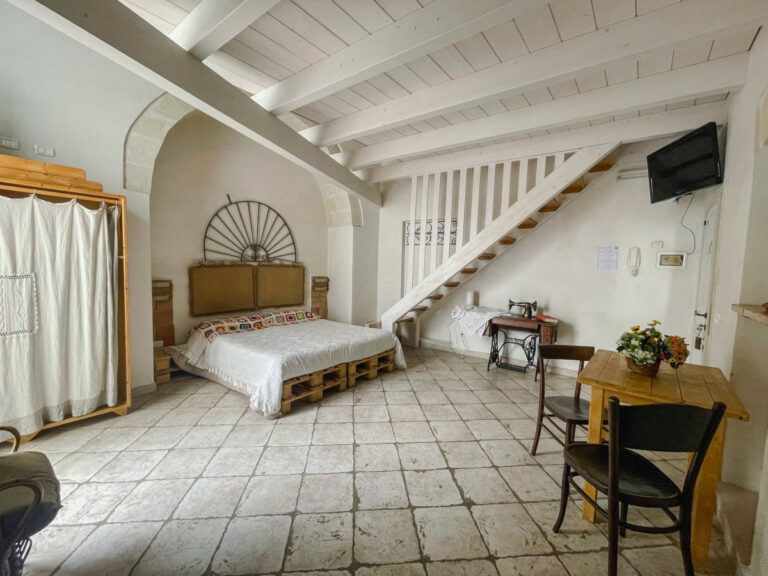Holiday Home ‘910
From the scent of the ancient to the whiteness of the walls, the Holiday Home 910 is located in the oldest place of the entire structure. The small veranda (formerly an ancient garden) marks the starting point; from this, in fact, through a wooden staircase that has been there for over 100 years, one accessed a room in the old “alcove” in which the basic necessities were hidden: oil, cured meats, legumes, wheat and so on. in order to avoid paying duty taxes. The house has six beds, including two double beds and a bunk bed, spread over two levels (with mezzanine), an independent kitchen with fridge, a beautiful equipped veranda, private bathroom, air conditioning, TV, heating system and safe.
The history of ‘910
The beds, original in workmanship and creation, are the result of a work of recovery and assembly of EPAL EUR platforms used for various transport, which are placed alongside the old sewing machine from 1910… and where the gaze opens onto a glimpse of the our rural landscape with olive trees and ripe wheat! Just inside the house, an ancient wrought iron overdoor appears on the wall, typical of 19th century doors, which has now become the headboard of the main bed of the house, enriched by two large cushions made with jute bags. The appliquès are made with glass jars covered with raw sack caps, in which legumes from our lands have been placed (white broad beans, beans, lentils etc.) which, when illuminated, give a touch of originality to the room. The kitchen complete with hob with adjoining accessible courtyard (equipped with bench, chairs and table), was made with recycled and treated wood; in the front, the laying of the ancient bricks decorated in cement in pandance with the chandelier made of shells set in wire and colored is evident. The white tin gas cooker and wooden handles take us back to a distant era where it was the heart of the house. Above the shelves on the same floor you can see an ancient plate scale dating back to the years 1910-1915 for weighing pasta and legumes. The slightly revisited “plate rack” is completely unique: made from very ancient agricultural tools (a wooden shovel and a hay fork) intertwined with jute thread and rough twine on which part of the aluminum pots and pans dating back to to those years (pans, ladles, colanders, etc.). You will also be able to find the ancient striped wooden board “stricatùr-rag” which was used to dry clothes, reinvented as a breakfast tray. Everything was enriched by orange curtains made on the models of the time, with ribbons and ties for the closures (when zips were just a hybrid) which underline their simplicity and functionality. In the same holiday home, the bathroom, in addition to being equipped with all comforts, is also the result of an ad hoc renovation. The same represented the ancient passage that led from the bedroom to the kitchen. You can still see the point where the passage narrowed where the shower was built today; here too the theme of peasant simplicity returns with the “wooden boxes for transporting fruit” assembled into particular bathroom furniture, the “rake for unraveling straw” which has become the robe hanger, the ceramic “capasella” the basket waste bin. The towel holder was created by positioning it horizontally on the wall of an old ladder once used by farmers to reach the highest branches of olive trees, shake them and drop the fruit into the net for subsequent harvesting. On the mezzanine, made entirely of wood, there is the double bed, also made with EPAL EUR platforms treated and worn natural, and on which you can touch the ancient vault firsthand; from the center of it unravels a “braid” of rough nets and white linen fabrics that create the canopy. A green light diffuses into the room which comes from the lamps made with large glass “demijohns” which were used to preserve the olives and oil. Adjacent to this, there is a room with a bunk bed assembled in a completely original way with wood and platforms on the sides of which, as a ladder that allows access to the upper bed, an ancient country staircase that served to prune olive trees. Equipped with every comfort and the right privacy for the guests who occupy it, it is a holiday home where the past, memories and peasant traditions are enhanced by noteworthy details and where the furnishings are essentially based on the recovery of recycled materials and ancient objects used for other purposes.

